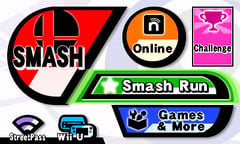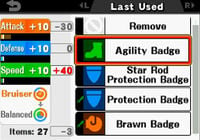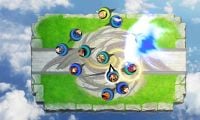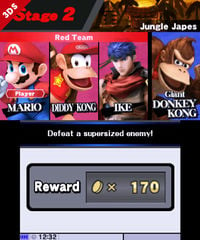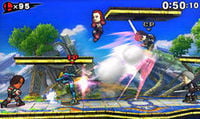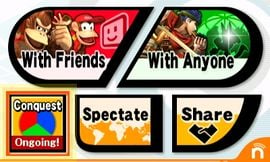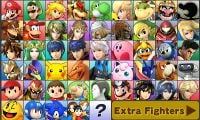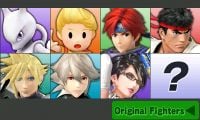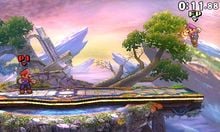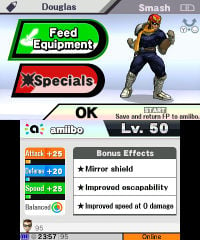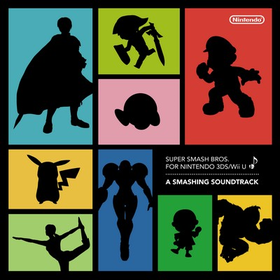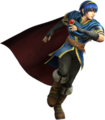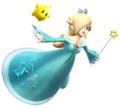Super Smash Bros. for Nintendo 3DS
Super Smash Bros. for Nintendo 3DS is the joint fourth installment and the first handheld game in the Super Smash Bros. series. Sora Ltd. and Bandai Namco Games developed these games.[1] It was developed at the same time as its partner game, Super Smash Bros. for Wii U, but Super Smash Bros. for Nintendo 3DS was released earlier due to earlier completion. It shares many similarities in terms of content as its partner game, but it has a few exclusives, most notably, the Smash Run mode. It can also connect with its partner game and transfer customized characters between each other, and the Nintendo 3DS can be used as a controller for the Wii U version. The game requires 9,108 blocks of memory on an SD Card, if downloaded from the Nintendo eShop.[2] Screenshots could not be posted to the game's Miiverse community[3] from an original Nintendo 3DS model, as the game's high processing requirements stopped Miiverse from being accessible when the game is active. The New Nintendo 3DS, however, could access Miiverse, due to its improved processing power.
Gameplay
Super Smash Bros. for Nintendo 3DS features similar gameplay to its predecessors, although it most closely resembles the engine in Super Smash Bros. Brawl. For instance, air dodging has remained the same and Final Smashes and Footstool Jumping have returned, although random tripping has been removed.[4]
The core gameplay of the Super Smash Bros. games consist of characters having percentages starting at zero. When they take damage, their percentages rise and they get more easily knocked away. A character is KO'd once that character is knocked far enough, beyond the blast line, indicated by a colorful explosion, falling in the background and turning into a star, or hitting the screen.
Characters can attack with simple button commands. The button is used generally for standard attacks, and the direction of
while
button is pressed can dictate the direction, type, and strength of attack. Tapping
while pressing
initiates a Smash Attack, a strong move which is often used to score KOs.
is used for special attacks, which can vary from character to character, although their up specials tend to be recovery moves. Players can shield to block attacks with
. Grabbing, which can stop shielding or help position opponents, is done with
. The trigger buttons have been switched from the previous Super Smash Bros. games, where one left should button is used for shielding while one right shoulder button is used for grabbing.
Each character is given at least two jumps, activated by pressing ,
, or by pressing up on
, which can be extended once with an up special move, usually. If players are knocked out of the stage, they can use these jumps to attempt to recover to the stage.
Aesthetically, in the transition from Super Smash Bros. Brawl, the overall theme has been changed, with brighter and bolder colors, and character appearances and aesthetic details more closely matching the aesthetics of their series of origin. Due to the smaller screen size of the Nintendo 3DS compared to a television screen, Super Smash Bros. for Nintendo 3DS also features black outlines around each fighter. Players can adjust the outline from three options: thick, thin, and none. In addition, during a team match, regardless of the option, an outline corresponding to the team color surrounds the character, allowing players to choose any of the existing alternate costumes, rather than assigning a certain colored costume to that character to match the team color like in all previous installments.
Customization/cross-connectivity
- Main article: Equipment
Players can customize each fighter by giving them equipment to increase specific attributes (attack, defense, or speed) while sacrificing others. Up to three pieces of equipment can be equipped at a time, and some items provide additional side effects to the fighter. Players can customize fighter's special attacks with one of three variations for each, provided that the variations are unlocked first. The Mii Fighters and Palutena, however, have custom special attacks that are completely original moves rather than variants of existing moves; these are unlocked from the beginning. Players can have up to ten custom characters saved at a time, though the player can have as many Mii Fighters as they want. Custom characters cannot be used in With Anyone online.
Players can send customized fighters from one version to the other. Custom fighters transferred from one version cannot be edited on the receiving version, however. Additionally, by connecting the two games the player can use their Nintendo 3DS as a controller for the Wii U version[5].
Exclusive modes
Smash Run
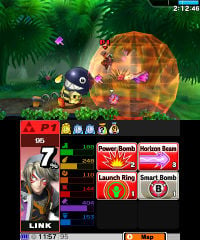
A new mode, Smash Run is a Nintendo 3DS-exclusive single-player and multiplayer mode strongly resembling the City Trial mode from Kirby Air Ride while including elements of the Subspace Emissary mode from Super Smash Bros. Brawl. In this mode, players travel in a large maze-like map, fighting enemies from both Nintendo games and from Super Smash Bros. games, such as Magikoopas, Chandelures, Goombas, Shy Guys, and Kremlings. Before going into battle, players can equip powers, which have a variety of effects, such as being a more powerful attack, temporarily increasing stats, healing, or equipping the player with an item. The player can equip only a certain number of powers based on their weight, the maximum weight being determined by the player's current equipment and the fighter.
While fighting, players can collect several items similar to patches. These stat boosts can increase attack power, special attack power, jumping, or movement speed; there are also special stat boosts which increase all stats. After five minutes, players are shown their final stats, courtesy of the stat boosts they collected, and they are pitted in one of several modes, similar to the Stadiums from City Trial, in which players must fulfill the given conditions to win.
StreetSmash
StreetSmash is another new game mode serving as the StreetPass functionality for Super Smash Bros. for Nintendo 3DS. Players compete against other player character's tokens with their own by charging into them to knock them off the stage. Players attack by holding down the to build up power, then letting it go and holding the Control Pad in a certain direction to charge forward into an opponent. Players can also shield by pressing
, and can dodge by moving when shielding; pressing
after dodging allows the player to counterattack. In StreetSmash mode players can either play against other players they have StreetPassed with or in practice mode; both allow the player to earn gold.
Games & More
Classic
Like previous games in the series, Classic mode has the player travel through a series of challenges to reach the end. However, this mode is shorter than before, only being six stages long. Before starting, the player can adjust the difficulty level by betting gold, exactly like the Fiend's Cauldron from Kid Icarus: Uprising; a higher difficulty yielding better rewards. The player can also choose to lower the intensity below 2.0, but has to pay 5G for every level decrease that's made. Intensity level 2.0 doesn't require any gold to play. If at any point the player gets a game over, the intensity level automatically lowers itself by .5 if they decide to try again. However, the intensity will never drop below 2.0; if the player plays on a difficulty lower than 2.0 and gets a game over, the intensity also does not lower.
Before each challenge, the player travels across a map, and they can select which challenge to face by taking one of the diverging paths colored by difficulty, with blue being the easiest, green being medium, and red being the hardest; opponents are based upon the characters the player has unlocked, and unlocking any characters allows the player to face them in Classic. After each match, the player can receive various rewards, including gold, trophies, and custom parts; the exact type of reward depends on the results of a roulette before the battle. As the intensity increases, so does the number of rewards.
Classic Mode consists of six rounds: four are normal, the fifth involves fighting 10 enemies that are significantly easier to launch (either a "team" of a character or the Fighting Mii Team), and the final round is a boss fight. The player can face either Master Hand or, if the intensity is 3.0 or higher, the player can choose a black path to fight both Master Hand and Crazy Hand. (If the intensity is 8.0 or higher, then only the black path will be available.) If the intensity is 5.1 or higher, the player must also fight the Master Core. The number of its forms the player will have to fight varies depending on the intensity level.
| Level | Intensity | Wager | Final Battle | |
|---|---|---|---|---|
| Path 1 | Path 2 (Black Path) | |||
| Effortless | 0.0 to 0.9 | 55 to 100 | Master Hand | N/A |
| Easy | 1.0 to 1.9 | 5 to 50 | Master Hand | N/A |
| Standard | 2.0 to 2.9 | 0 to 72 | Master Hand | N/A |
| Tougher | 3.0 to 3.9 | 80 to 188 | Master Hand | Master Hand and Crazy Hand |
| Challenging | 4.0 to 4.9 | 200 to 335 | Master Hand | Master Hand and Crazy Hand |
| Heatin' Up | 5.0 to 5.9 | 350 to 530 | Master Hand | Master Hand, Crazy Hand, and Master Core (5.1 or higher) (Master Edges, Master Shadow) |
| Extra Spicy | 6.0 to 6.9 | 550 to 775 | Master Hand | Master Hand, Crazy Hand, and Master Core (Master Beast, Master Edges, Master Shadow) |
| Infernal | 7.0 to 7.9 | 800 to 1205 | Master Hand | Master Hand, Crazy Hand, and Master Core (Master Giant (7.5 or higher), Master Beast, Master Edges, Master Shadow) |
| White Hot | 8.0 to 8.9 | 1250 to 2105 | N/A | Master Hand, Crazy Hand, and Master Core (Master Giant, Master Beast, Master Edges, Master Shadow) |
| Nothing Harder! | 9.0 | 2200 | N/A | Master Hand, Crazy Hand, and Master Core (Master Giant, Master Beast, Master Edges, Master Shadow) |
All-Star
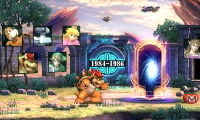
All-Star mode also returns from Super Smash Bros. Melee and Super Smash Bros. Brawl and up to two players can play together locally just like the latter game. In this mode, players fight against every playable character (except for the Mii Fighters) until they reach the end; this time, however, characters are organized by time periods they were introduced in rather than by series. All-Star Mode is also available from the beginning of the game, though the player can only play against the default roster until every character is unlocked. After each match, players may be given a reward, and occasionally a trophy or custom part will appear in the break room. The break room also gives the player a Maxim Tomato, Fairy Bottle, and Heart Container to heal between matches; in the full All-Star mode, the player is given a second Heart Container. However, the items will not return once consumed unless the player starts over. When All-Star Mode is cleared, the player earns a trophy of an alternate color of their character rather than a Final Smash trophy like in the previous game.
Like in Brawl's Boss Battles Mode, if the player runs out of time or loses their one stock, there are no continues and the player receives a Game Over, which leads to the results display screen showing the gold, Global Smash Power, score, trophies, and custom parts that the player earned so far.
Also All-Star Mode can be found in Group Mode.
*- Only available in the full All-Star mode.
**- Downloadable content. Only available in this mode after downloading (characters only available in the full All-Star mode), but it will be removed from the list if the player deletes the game's DLC data. Inclusion does not affect any of the game's challenges.
Training
Training also returns from previous games, identical to the previous games. Within Training, players can train against a computer opponent, and can automatically select items that appear, game speed, the number of CPU opponents, their behavior, and the current amount of damage for all players. The player can also adjust the camera view and toggle the info display at the top of the screen, as well as restart the session or quit.
Stadium
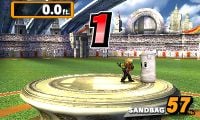
In Stadium mode, three different games are available: Multi-Man Smash, Home-Run Contest, and Target Blast. The Home-Run Contest works like in previous games, in that players have ten seconds to build up damage on the Sandbag before having to launch it as far as they can. Several tweaks have also been made to this mode from Super Smash Bros. Brawl, such as having a more durable shield.
In Multi-Man Smash, the player fights against the Fighting Mii Team, consisting of Miis loaded from those on the player's system. The Miis are easier to launch in every mode aside from Cruel Smash, and sometimes platforms will appear with items on them. Two players can also play this mode together via local wireless. The options for this mode are the same as in the previous games, though with a brand new mode as well:
- 10-Man Smash - The player must defeat ten enemies.
- 100-Man Smash - The player must defeat 100 enemies.
- 3-Minute Smash - The player must defeat as many Miis as possible in three minutes.
- Rival Smash - A brand new mode, in which players compete against a computer version of themselves to defeat as many enemies as possible before being KO'd. Once KO'd, however, only the difference between scores is counted as the player's final score; if the player KO's less Miis than the opponent, their score is zero.
- Endless Smash - The player must defeat as many enemies as possible before being KO'd.
- Cruel Smash - The player must fight against more difficult enemies that can easily KO the player, and defeat as many as possible.
Target Blast functions like a combination of the Home-Run Contest and Target Smash in previous games. In this mode, players have ten seconds to attack and launch a bomb to destroy as many targets as possible; the countdown starts as soon as the player starts attacking. There are fourteen large, red targets and several more smaller, green amongst structures that must be broken through; a trophy, piece of equipment, or special move may also be among the targets. Also scattered throughout are explosives that can be detonated by having the bomb touch them. The player has two rounds to break as many targets as they can and accumulate the highest score possible.
Vault
Within the vault, players can view collected trophies, snapshots taken during play, and saved replays; listen to the game's music and voices in the sounds menu; view records; and view a series of tips.
Trophies
- Main article: List of trophies in Super Smash Bros. for Nintendo 3DS
There are a total of 707 trophies in the 3DS version. Within the trophies menu itself, players have the option of viewing their collected trophies or earning more by either buying them in the shop or by playing the Trophy Rush minigame.
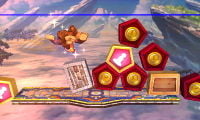
In Trophy Rush, the player must pay gold to increase the amount of time they spend in the minigame, the minimum being thirty seconds and the maximum being 2:30. In the game itself, players must attack crates and rock blocks as they fall from above to destroy them; destroying multiple consecutively creates a chain that increase the player's score. Bomb blocks also fall and explode after three seconds. Destroying the falling blocks builds up a meter that, when full, initiates "Frenzy", in which gold, trophies, and on occasion custom parts fall from above for the player to collect. If the blocks and crates reach above a certain point or the player falls off the stage, the stage disappears, clearing the board and, in the case of the former, costing the player time.
Challenges
- Main article: Challenges (Super Smash Bros. for Nintendo 3DS)
Also returning from Super Smash Bros. Brawl are Challenges. In this mode, players are given a board of challenges which can be completed by clearing the given criteria. Clearing a challenge unlocks a picture on the top screen as well as a trophy, custom part, stage, CD, Smash Run power, or Poké Ball Pokémon. Completing a certain number of challenges on a given panel unlocks a new panel of challenges. Occasionally the player will also be rewarded with a Golden Hammer, which can be used to automatically clear a challenge.
Online
This game features online play similar to Super Smash Bros. Brawl in that players from all over the world can face others in matches. When playing With Friends, players can customize the rules to their liking. When playing With Anyone, two basic options are available: For Fun and For Glory. In For Fun mode, players battle on randomly-selected normal stages, excluding Final Destination, with all items turned on. Losses are not recorded in this mode. In For Glory mode, players only play on the flat, Final Destination versions of stages, without items. Players can either play standard Smash or Team Smash matches in both modes, and For Glory offers a 1-on-1 mode as well.
Conquest became available in the Nintendo 3DS version through an update on September 15, 2014 in Japan, and October 2, 2014 in all other regions. Conquests pit some of the game's various characters against each other, and players who win battles with them in With Anyone mode will add points to that character's score. After a few days, the winning fighter is revealed, players who took part in the conquest by playing as that character get rewarded with gold, and the next conquest begins.
Spectate mode allows players to view matches and bet gold on their outcome, view replays of past online matches, and view a map showing the players currently online.
As of version 1.0.5, there is also a Share mode, which allows players to send and download screenshots, replays, and Mii Fighters from around the world. Players can share their Mii Fighters and replays with friends or post them to the server, while snapshots can also be posted to Miiverse. When searching for replays players can search by their creator (self, anyone, or friends), location, mode, stage, and character; when searching for snapshots or Mii Fighters, players can search by creator, location, and, in the case of Mii Fighters, the type of fighter.
Rather than an online leaderboard, the game makes use of a different type of ranking system, called "Global Smash Power". A player's GSP score is recorded for each of the various single-player modes, the number indicating how many players around the world they outrank.
Playable characters
It has been requested that this section be rewritten. Reason: previous Super Smash Bros. articles use original character descriptions as opposed to Trophy descriptions
Counting the three types of Mii Fighters as individual characters, the Koopalings and all downloadable content, Super Smash Bros. for Nintendo 3DS features a total of 58 playable characters, the roster being consistent across both games. The base roster consists of 51 characters (counting each Mii Fighter), featuring 36 returning characters and 15 new ones. In addition, 36 characters are available by default, while 12 more can be unlocked, and Mii Fighters can only be chosen when one is created. Finally, seven characters have been released as downloadable content: returning fighters Mewtwo, Lucas, and Roy, and newcomers Ryu, Cloud, Corrin, and Bayonetta. The character selection screen is divided up into two sections: Original Fighters, characters already part of the core game, and Extra Fighters, characters purchased as downloadable content.
To keep the rosters consistent across both games, certain characters and features have been removed, partly due to limitations with the Nintendo 3DS hardware. One of the removed features was mid-battle transformations, leading to Charizard, Sheik, and Zero Suit Samus to be added as separate characters.
NOTE: Characters in italics are newcomers.
Default characters | ||||
|---|---|---|---|---|
| Character | Trophy Description | Special Attacks | Final Smash | |
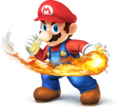 Mario |
As iconic as iconic gets, this gaming celebrity is known for saving the world from Bowser. He’s got amazing jumping skills and makes use of a wide range of transformations. In his free time, he plays too many sports to count. In Smash Bros., he’s a well-rounded fighter you can rely on. Say it with me: “It’s-a me, Mario!” | Standard - Fireball Side - Cape Up - Super Jump Punch Down - F.L.U.D.D. |
Mario Finale | |
 Luigi |
Luigi recently celebrated his 30th anniversary with the Year of Luigi, but all that attention just made him even more shy and awkward. In Smash Bros., Luigi takes a lot of cues from his brother in fighting style, adding flair to moves like Super Jump Punch. His taunts, however, are truly unique. | Standard - Fireball Side - Green Missile Up - Super Jump Punch Down - Luigi Cyclone |
Poltergust 5000 | |
 Peach |
Princess of the Mushroom Kingdom, Peach continues to prove that "powerful" and "cute" are not mutually exclusive. In Smash Bros., Peach uses her dress to float above the fray, suddenly descending and attacking with numerous weapons. A frying pan? Umbrella? TOAD?! Where does she keep it all? | Standard - Toad Side - Peach Bomber Up - Peach Parasol Down - Vegetable |
Peach Blossom | |
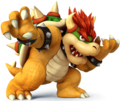 Bowser |
The archenemy of Mario and the reason Peach spends more time kidnapped than in her own castle. His plans aren't always the best, and occasionally he even finds himself on Mario's side. In Smash Bros., he's a serious heavyweight who laughs off weaker attacks. Hit him hard to send him flying! | Standard - Fire Breath Side - Flying Slam Up - Whirling Fortress Down - Bowser Bomb |
Giga Bowser | |
 Yoshi |
As dependable a partner as one could hope for, Yoshi often aids Mario in his adventures. Yoshi can swallow just about anything and make an egg of it instantly. He's got some serious airborne power, making launching opponents skyward and then following up with more attacks a wise choice. | Standard - Egg Lay Side - Egg Roll Up - Egg Throw Down - Yoshi Bomb |
Super Dragon | |
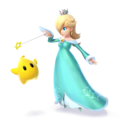 Rosalina & Luma |
The mysterious Rosalina lives in the Comet Observatory with the Lumas. She first traveled with them in search of their mother. In Smash Bros., Rosalina and Luma can fight in different places at the same time. If you can trap someone between Rosalina and Luma, you'll be able to unleash incredible damage! | Standard - Luma Shot Side - Star Bits Up - Launch Star Down - Gravitational Pull |
Power Star | |
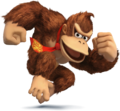 Donkey Kong |
This king of the jungle really, really loves bananas. His adventures usually start with people stealing his hoard of them. In Smash Bros., he's known for his incredible strength and long reach. Despite his size, he's still pretty quick. He can even jump carrying heavy items! Use this knowledge well. | Standard - Giant Punch Side - Headbutt Up - Spinning Kong Down - Hand Slap |
Konga Beat | |
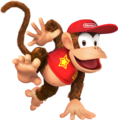 Diddy Kong |
Donkey Kong's trusty partner. He sports his signature look: red hat, red shirt, Rocketbarrel Pack. In Smash Bros., he's incredibly agile. Charge the Rocketbarrel Pack by holding down the button before launch, and you can steer with left and right. Don't forget to drop banana peels--enemies love it! | Standard - Peanut Popgun Side - Monkey Flip Up - Rocketbarrel Boost Down - Banana Peel |
Rocketbarrel Barrage | |
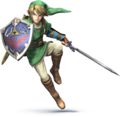 Link |
Green clothes? Pointy hat? Yep, it's Link, all right! In this game, his sword and shield make for effective attacking and blocking, and his bow, bombs and boomerang will spice up any battle. He's even brought his Clawshot for grabbing enemies and edges. Jeez, just how much stuff can Link carry? | Standard - Hero's Bow Side - Gale Boomerang Up - Spin Attack Down - Bomb |
Triforce Slash | |
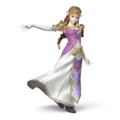 Zelda |
This is the namesake of the Legend of Zelda games. Her appearance may change, but she always plays an important role. In Smash Bros., she's quick on the draw when it comes to magic, though a bit slow when moving. She has a new move that summons a Phantom to her aid. | Standard - Nayru's Love Side - Din's Fire Up - Farore's Wind Down - Phantom Slash |
Light Arrow | |
 Sheik |
In The Legend of Zelda: Ocarina of Time, Sheik claimed to be a surviving Sheikah. However, this was just a cunning disguise for Princess Zelda so that she could escape Ganondorf. In Smash Bros., she's the complete opposite of Zelda, striking with fast attacks that can keep an opponent off balance. | Standard - Needle Storm Side - Burst Grenade Up - Vanish Down - Bouncing Fish |
Light Arrow | |
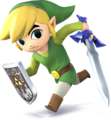 Toon Link |
This cartoonish version of Link is how he appeared in The Legend of Zelda: The Wind Waker and a few other titles. In Smash Bros., he uses moves much like his older, taller counterpart. His small size gives him extra speed, though, so take advantage of that to send your foes flying. | Standard - Hero's Bow Side - Boomerang Up - Spin Attack Down - Bomb |
Triforce Slash | |
 Samus |
Samus Aran has fought her way across a variety of planets in the Metroid series. She wears a Power Suit designed by the Chozo, giving her incredible versatility in a fight. She can wade in, but she favors beams and missiles. A fully charged Charge Shot packs a serious punch! | Standard - Charge Shot Side - Missile Up - Screw Attack Down - Bomb |
Zero Laser | |
 Zero Suit Samus |
Samus is far from helpless when her Power Suit is deactivated. Sure, she loses a lot of the moves and weapons she had access to before, but her Jet Boots pick up the slack! She also has the Paralyzer, a versatile weapon that can shock her rivals or change into a Plasma Whip to grab edges and enemies. | Standard - Paralyzer Side - Plasma Whip Up - Boost Kick Down - Flip Jump |
Gunship | |
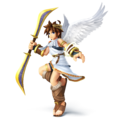 Pit |
Pit is the captain of Palutena's royal guard. Despite the wings on his back, Pit needs the Power of Flight from Palutena in order to truly fly. In Smash Bros., he can still get more air than most, with four jumps and a special move that boosts him higher. He has a new reflect move-it protects both sides! | Standard - Palutena Bow Side - Upperdash Arm Up - Power of Flight Down - Guardian Orbitars |
Three Sacred Treasures | |
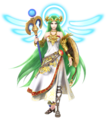 Palutena |
In Kid Icarus: Uprising, the goddess of light uses telepathy to communicate and grants miracles to support Pit on his adventure. In Smash Bros., she has special moves like Warp and Heavenly Light at her disposal. She's very adaptable-you can customize her into a long- or close-range fighter! | Standard - Autoreticle / Explosive Flame / Heavenly Light Side - Reflect Barrier / Angelic Missile / Super Speed Up - Warp / Jump Glide / Rocket Jump Down - Counter / Lightweight / Celestial Firework |
Black Hole Laser | |
 Marth |
The first hero from the Fire Emblem series, Marth is the prince of Altea and descendant of the hero Anri. In Smash Bros, he's known as an exceptional swordfighter, swinging his blade with grace. Striking with the tip will maximize the damage dealt. Teach aggressive foes a lesson with his strong Counter move. | Standard - Shield Breaker Side - Dancing Blade Up - Dolphin Slash Down - Counter |
Critical Hit | |
 Ike |
One of the main characters of the Fire Emblem series. Having fought in the Mad King's War, restored the fallen nation of Crimea and taken on the Begnion Empire, Ike is rightly called a hero. He has the strength to back the title-one good swing of his blade can launch the heaviest of foes. | Standard - Eruption Side - Quick Draw Up - Aether Down - Counter |
Great Aether | |
 Robin Male/female variants |
This is the male Robin, an avatar in Fire Emblem Awakening. The goal of that game doesn't change much because of your gender choice, but Robin's hairstyle options do. In Smash Bros., Robin brings powerful magic and swordplay to bear. He can exhaust his moves, but they'll be restored over time. | Standard - Thunder Side - Arcfire Up - Elwind Down - Nosferatu |
Pair Up | |
 Kirby |
Round little Kirby lives on the peaceful Planet Popstar, in Dream Land. He can inhale things with his big mouth, either copying their abilities or spitting them out again. In Smash Bros., Kirby can inhale opponents and copy their standard specials. He gets launched easily but recovers well. | Standard - Inhale Side - Hammer Flip Up - Final Cutter Down - Stone |
Ultra Sword | |
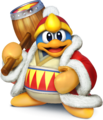 King Dedede |
He calls himself the King of Dream Land, but he doesn't have a lot of interest in ruling. He really loves to eat, so it's no surprise he's a heavyweight fighter. Despite his size and low speed, he can easily recover with his four jumps. His Jet Hammer will leave a mark on everyone he meets. | Standard - Inhale Side - Gordo Throw Up - Super Dedede Jump Down - Jet Hammer |
Dedede Burst | |
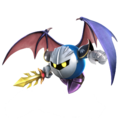 Meta Knight |
Kirby's mysterious rival, this masked swordsman appears in several Kirby games. His cape transforms into wings to grant him flight. In Smash Bros., his quick sword skills and aerial agility set him apart. He can jump up to five times in a row and he has a special move to soar higher. | Standard - Mach Tornado Side - Drill Rush Up - Shuttle Loop Down - Dimensional Cape |
Galaxia Darkness | |
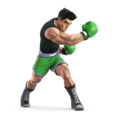 Little Mac |
This little boxer from the Punch-Out!! series makes up in heart what he lacks in height. He wasn't afraid to take on the boxing champs, and he's not afraid of the Nintendo stars. In Smash Bros., he packs a serious punch. When his KO Meter fills up, wade in and trigger a devastating uppercut. | Standard - Straight Lunge Side - Jolt Haymaker Up - Rising Uppercut Down - Slip Counter |
Giga Mac | |
 Fox |
Fox is the leader of the mercenary unit Star Fox, often enlisted to defeat the evil Andross. His piloting skills are top notch, but in Smash Bros. he brings speed and fast attacks to the battle. His Reflector move allows him to turn projectile attacks against his foes, increasing their power for a punishing blow. | Standard - Blaster Side - Fox Illusion Up - Fire Fox Down - Reflector |
Landmaster | |
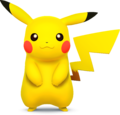 Pikachu |
Recognized the world over, Pikachu is an Electric-type Pokémon that stores energy in its cheeks for use in battle. In Smash Bros., Pikachu is a well-rounded fighter with speedy, powerful electric attacks. Quick Attack can be used twice in a row if two directions are input, one after another. | Standard - Thunder Jolt Side - Skull Bash Up - Quick Attack Down - Thunder |
Volt Tackle | |
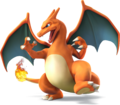 Charizard |
The iconic Fire/Flying-type Pokémon. Charizard's scorching breath can melt anything in its path. It soars through the air, seeking only worthy foes to test itself against. In Smash Bros., Charizard unleashes the destructive Flare Blitz special move-a move so strong, it even injures the user! | Standard - Flamethrower Side - Flare Blitz Up - Fly Down - Rock Smash |
Mega Evolution | |
 Lucario |
A Fighting/Steel-type Pokémon that excels in combat through the reading and manipulation of Aura. As Lucario takes more damage, its attacks grow in strength. At maximum power, Lucario deals triple damage and its Aura Sphere is particularly devastating! Foes won't even know what hit them! | Standard - Aura Sphere Side - Force Palm Up - Extreme Speed Down - Double Team |
Mega Evolution | |
 Greninja |
This Water/Dark-type Pokémon is the fully evolved form of Froakie. It's just as fast and dangerous as any other ninja, and the throwing stars it can make out of water can shear metal. In Smash Bros., as well as being a graceful, speedy fighter, it can also use moves like Hydro Pump to let it move through the air and avoid falling. | Standard - Water Shuriken Side - Shadow Sneak Up - Hydro Pump Down - Substitute |
Secret Ninja Attack | |
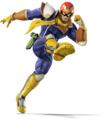 Captain Falcon |
In the F-Zero racing scene, Captain Falcon uses his Blue Falcon to win big. His origins largely a mystery, he's made his way to the Smash Bros. battlefield to prove his worth outside the cockpit. He's got speed and power, and his distinct Falcon Punch leaves a dent. Start it in the air to surprise your foes! | Standard - Falcon Punch Side - Raptor Boost Up - Falcon Dive Down - Falcon Kick |
Blue Falcon | |
 Villager Male/female variants |
An energetic young man from a peaceful town in Animal Crossing, he is eager to make his Smash Bros. debut! His Balloon Trip recovery lets him fly like a character from Balloon Fight. The Villager sets out to answer that age-old question: If a tree falls on the battlefield and foes are beneath it, do they get launched? | Standard - Pocket Side - Lloid Rocket Up - Balloon Trip Down - Timber |
Dream Home | |
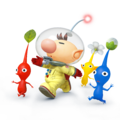 Olimar Alternate character: Alph |
A veteran spaceship pilot for Hocotate Freight, Captain Olimar partners with Pikmin in Smash Bros. to help him in battle. Olimar is much stronger when he's got Pikmin with him, so keep them plucked and good to go. Pikmin abilities are based on their color-learn where each is best at! | Standard - Pikmin Pluck Side - Pikmin Throw Up - Winged Pikmin Down - Pikmin Order |
End of Day | |
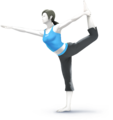 Wii Fit Trainer Male/female variants |
The female trainer who helps you in the Wii Fit series. She favors a fighting style composed of yoga poses. This makes her a capable close-quarters fighter, but she has ranged attacks as well. She also has a move called Deep Breathing, which can heal you and increase attack power if timed right. | Standard - Sun Salutation Side - Header Up - Super Hoop Down - Deep Breathing |
Wii Fit | |
 Shulk |
In Xenoblade Chronicles, this young lad's colony is attacked by the Mechon, so he and his friends set off to take them down. In Smash Bros., his Monado Arts let him change his specialization during battle. You can choose to boost a stat-his jump or attack, for example-but other stats might drop as a result, so choose wisely. | Standard - Monado Arts Side - Back Slash Up - Air Slash Down - Vision |
Chain Attack | |
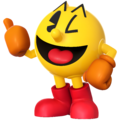 Pac-Man |
The yellow, circular hero of the game PAC-MAN, which is recognized as the "Most Successful Coin-Operated Arcade Game" by Guinness World Records. In Smash Bros., he uses several moves inspired by the original PAC-MAN. Wakawaka your foes by charging up the Power Pellet move and aiming at them. | Standard - Bonus Fruit Side - Power Pellet Up - Pac-Jump Down - Fire Hydrant |
Super Pac-Man | |
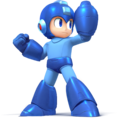 Mega Man |
The main hero from Capcom's 1987 action game, Mega Man. He travels from stage to stage, defeating Robot Masters to obtain new weapons. He uses this vast arsenal in Smash Bros. in a variety of ways. Metal Blades, for example, can be fired in eight directions and picked up off the ground! | Standard - Metal Blade Side - Crash Bomber Up - Rush Coil Down - Leaf Shield |
Mega Legends | |
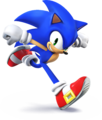 Sonic |
The main star of the Sonic the Hedgehog series. He's an easygoing hedgehog who blows past the competition with his speed. Seriously, on the ground he's faster than anyone else in Smash Bros. Use this to your advantage, avoiding blows while landing lightning-fast attacks. | Standard - Homing Attack Side - Spin Dash Up - Spring Jump Down - Spin Charge |
Super Sonic | |
Unlockable characters | ||||
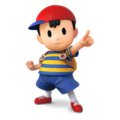 Ness |
Hailing from Onett, a small town in Eagleland, this young boy's ordinary looks hide his psychic powers. Ness fought against the evil Giygas in EarthBound, and in Smash Bros. he unleashes some of the same PSI moves. Watch out for PK Thunder, a guided attack that can also launch Ness like a rocket! | Standard - PK Flash Side - PK Fire Up - PK Thunder Down - PSI Magnet |
PK Starstorm | |
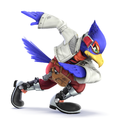 Falco |
A talented pilot and part of the Star Fox team, Falco can be a bit rough around the edges. He once led his own galactic gang before joining up with Fox. In Smash Bros. his ability to jump high and deal damage in the air makes him a powerful threat and his thrown Reflector can catch foes by surprise. | Standard - Blaster Side - Falco Phantasm Up - Fire Bird Down - Reflector |
Landmaster | |
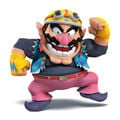 Wario |
A living embodiment of gross, this villian hates Mario and loves money. He claims to have known Mario since childhood, but who can tell if that's true? In Smash Bros., he's a seriously agile heavyweight fighter. He can store up his trademark Wario Waft for explosive results. Did I mention he's gross? | Standard - Chomp Side - Wario Bike Up - Corkscrew Down - Wario Waft |
Wario-Man | |
 Lucina |
Chrom's daughter and the future Princess of Ylissee. When she arrives from a doomed future seeking to prevent it from ever happening, she goes by the name Marth before her identity is revealed. She fights much like her adopted namesake, but her entire blade is equally powerful instead of having a more powerful tip. | Standard - Shield Breaker Side - Dancing Blade Up - Dolphin Slash Down - Counter |
Critical Hit | |
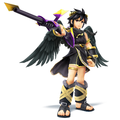 Dark Pit |
Pit's mysterious, black-clad doppelgänger, Dark Pit. (Some call him Pittoo, but he really doesn't like that.) When he first appears, he immediately goes after both Pit and the Underworld Army. In Smash Bros., he uses moves a lot like Pit's, though both his bow and his Sacred Treasures are different. | Standard - Silver Bow Side - Electroshock Arm Up - Power of Flight Down - Guardian Orbitars |
Dark Pit Staff | |
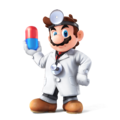 Dr. Mario |
In the 1990 puzzle game Dr. Mario, Mario threw on a white coat and decided to take a shot at that whole "medicine" thing. In this game, he's a balanced fighter who can throw Megavitamin capsules and nimbly deflect blows with his Super Sheet. He's not quite as quick as normal Mario, but his attacks deal a bit more damage. | Standard - Megavitamin Side - Super Sheet Up - Super Jump Punch Down - Dr. Tornado |
Doctor Finale | |
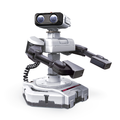 R.O.B. |
This NES accessory was released in 1985, a groundbreaking system that controlled the robot via a game on the screen. In Smash Bros., R.O.B. has two projectile weapons and can use his rocket base to fly through the air. If you let his Robo Beam charge over time, it'll make a powerful blast. | Standard - Robo Beam Side - Arm Rotor Up - Robo Burner Down - Gyro |
Super Diffusion Beam | |
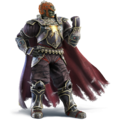 Ganondorf |
The King of Evil that awaits Link at the end of most of his adventures. Ganondorf possesses the Triforce of Power. In Smash Bros., he makes up for his low speed with devastating power. The strength of his blows can knock back most opponents. Get close with a dash attack and pummel your foes! | Standard - Warlock Punch Side - Flame Choke Up - Dark Dive Down - Wizard's Foot |
Beast Ganon | |
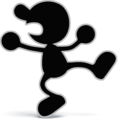 Mr. Game & Watch |
Game & Watch was first released in 1980, making the series the father of the Game Boy and Nintendo DS. Or maybe an older sibling? Anyway...in Smash Bros., Mr. Game & Watch uses distinct retro moves to damage his foes. However, he's only two dimensional, so he's pretty easy to send flying. | Standard - Chef Side - Judge Up - Fire Down - Oil Panic |
Octopus | |
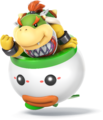 Bowser Jr. Alternate characters: The seven Koopalings |
Bowser's beloved, spoiled son sports a bandanna with a large mouth drawn on it. Like his father, Bowser Jr. longs to take Mario down. In Smash Bros., he'll fight from inside his heavily armed Junior Clown Car. The Clown Car takes less damage than Bowser Jr., so mind your positioning. | Standard - Clown Cannon Side - Clown Kart Dash Up - Abandon Ship Down - Mechakoopa |
Shadow Mario Paint | |
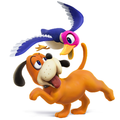 Duck Hunt* |
You could call these two the stars of the NES 1985 launch title Duck Hunt. The goofy dog would chase down any ducks hit by the NES Zapper. In Smash Bros., these two work as a team to fight. When a can or a clay pigeon is in play, hit the button again to fire at it. Show your foes how the ducks felt! | Standard - Trick Shot Side - Clay Shooting Up - Duck Jump Down - Wild Gunman |
NES Zapper Posse | |
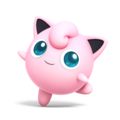 Jigglypuff |
This Normal/Fairy-type Pokémon is best known for its soothing singing, which can put foes to sleep. In Smash Bros., it fights best in the air and can even jump six times in a row. The downside, though, is that Jigglypuff's so light, most opponents could launch it in their sleep! | Standard - Rollout Side - Pound Up - Sing Down - Rest |
Puff Up | |
Extra characters | ||||
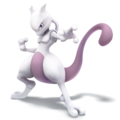 Mewtwo |
Mewtwo puts its psychic powers to great use in this game. Not only does it have floaty jumps, but its telekinesis gives its extra reach and its throws added power. However, its light body makes it easy to launch, so if you're willing to take the risk of getting in close, it might be worth it! | Standard - Shadow Ball Side - Confusion Up - Teleport Down - Disable |
Psystrike | |
| Release Date: April 28, 2015 (April 15, 2015 for Club Nintendo members who have purchased and registered both versions of the game) Price: US$3.99; US$4.99 if purchased with the Wii U version; free download for Club Nintendo members who have purchased and registered both versions of the game | ||||
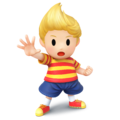 Lucas |
The younger of the twin brothers from Nowhere makes his triumphant return to the game of Smash. Hailing from the Japan-only game Mother 3, Lucas's specialty is psychic projectile attacks. He can use these PSI attacks to do things like absorb enemy projectiles and deal supernatural damage! | Standard - PK Freeze Side - PK Fire Up - PK Thunder Down - PSI Magnet |
PK Starstorm | |
| Release Date: June 14, 2015 Price: US$3.99; US$4.99 if purchased with the Wii U version | ||||
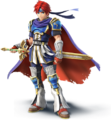 Roy |
Roy, the main character of Fire Emblem: The Binding Blade, returns for the first time since Melee! In The Binding Blade, Roy led the troops of Pherae into battle in his ailing father’s stead, and now he brings his speed and talent for short-range combat into this game. His sword, the Sword of Seals, is uniquely powerful at the base of the blade. | Standard - Flare Blade Side - Double-Edge Dance Up - Blazer Down - Counter |
Critical Hit | |
| Release Date: June 14, 2015 Price: US$3.99; US$4.99 if purchased with the Wii U version | ||||
 Ryu |
Ryu visits from the Street Fighter series! Ryu’s fighting style is based on karate, but he’s mixed in some other martial arts to make his own unique style. In Smash, he will perform either weak or strong attacks depending on if you press or hold down the buttons. His special attacks also have three power levels! | Standard - Hadouken Side - Tatsumaki Senpukyaku Up - Shoryuken Down - Focus Attack |
Shinku Hadoken / Shin Shoryuken | |
| Release Date: June 14, 2015 Price: US$5.99; US$6.99 if purchased with the Wii U version (both bundled with Suzaku Castle) | ||||
 Cloud |
The protagonist of FINAL FANTASY VII, Cloud wields the enormous Buster Sword, a memento from his comrad Zack. Once a SOLDIER of Shinra, he now fights as a mercenary against the corporation he originally served. His decision to join AVALANCHE's insurgence, however, will transform his destiny. | Standard - Blade Beam Side - Cross Slash Up - Climhazzard Down - Limit Charge / Finishing Touch |
Omnislash | |
| Release Date: December 15, 2015 Price: US$5.99; US$6.99 if purchased with the Wii U version (both bundled with Midgar) | ||||
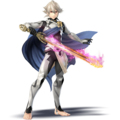 Corrin |
Corrin joins the battle from Fire Emblem Fates. Born in Hoshido but kidnapped by Nohr at a young age, Corrin was brought up by Nohrian royalty. Descended from the First Dragons, Corrin has the power to transform into a dragon. In Smash, Corrin can change parts of the body into lance-like hands and feet that have a long reach that deal more damage at the tips. | Standard - Dragon Fang Shot Side - Dragon Lunge Up - Draconic Ascent Down - Counter Surge |
Torrential Roar | |
| Release Date: February 3, 2016 Price: US$4.99; US$5.99 if purchased with the Wii U version | ||||
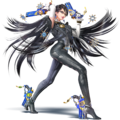 Bayonetta |
Bayonetta is one of the last of the near-extinct Umbra Witches clan. She's a master of the Bullet Arts and can use her hair as a conduit to bring forth Infernal Demons. She brings all these skills and more to Smash, where she'll unleash additional damage if you hold the attack button. Damage and distract your foes with this move! | Standard - Bullet Climax Side - Heel Slide / After Burner Kick Up - Witch Twist Down - Witch Time |
Infernal Climax | |
| Release Date: February 3, 2016 Price: US$5.99; US$6.99 if purchased with the Wii U version (both bundled with Umbra Clock Tower) | ||||
Custom characters | ||||
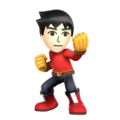 Mii Brawler |
This fighter is based on a player's Mii. It excels at fighting with punches and kicks. This type of Mii is very agile, blending attacks with movement to get the battle flowing. It has superior dash and jump compared to other types. Stay close and keep whaling on foes-you'll KO them in no time! | Standard - Shot Put / Ultimate Uppercut / Exploding Side Kick Side - Onslaught / Burning Drop Kick / Headache Maker Up - Soaring Axe Kick / Helicopter Kick / Piston Punch Down - Head-On Assault / Feint Jump / Foot Flurry |
Omega Blitz | |
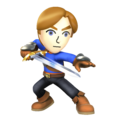 Mii Swordfighter |
This fighter is based on a player's Mii and favors a sword in battle. Enjoy the extra reach the sword offers, but remember that it takes a bit longer for strikes to reach your opponent as a result. Customize your Mii with chargeable moves, counters, or projectile attacks. | Standard - Gale Strike / Shuriken of Light / Blurring Blade Side - Airborne Assault / Slash Launcher / Chakram Up - Stone Scabbard / Skyward Slash Dash / Hero's Spin Down - Blade Counter / Reversal Slash / Power Thrust |
Final Edge | |
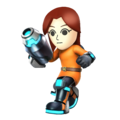 Mii Gunner |
A Mii sporting a blaster arm, this fighter is a great choice for those who prefer to fight the battle from a distance. The Mii Gunner has a lot of special projectile moves available, so pick your favorites and use them when needed. Don't forget about standard and smash attacks! | Standard - Charge Blast / Laser Blaze / Grenade Launch Side - Flame Pillar / Stealth Burst / Gunner Missile Up - Lunar Launch / Cannon Uppercut / Arm Rocket Down - Echo Reflector / Bomb Drop / Absorbing Vortex |
Full Blast | |
*Duck Hunt is referred to as Duck Hunt Duo in PAL regions.
Unlocking criteria
| Character | Criteria I | Criteria II | Stage of battle |
|---|---|---|---|
| Ness | Clear Classic Mode on any difficulty | Play 10 matches | Magicant |
| Falco | Clear Classic Mode without using continues | Play 20 matches | Corneria |
| Wario | Clear 100-Man Smash | Play 30 matches | WarioWare, Inc. (no microgames) |
| Lucina | Clear Classic Mode as Marth without using continues | Play 40 matches | Arena Ferox |
| Dark Pit | Clear Classic Mode with 3 different characters | Play 50 matches | Reset Bomb Forest |
| Dr. Mario | Clear Classic Mode as Mario on intensity 4.0 or higher | Play 60 matches | Mushroomy Kingdom |
| R.O.B. | Collect 200 trophies & clear Classic Mode with 6 different unlockable characters | Play 70 matches | PictoChat 2 |
| Ganondorf | Clear Classic Mode as Link or Zelda on intensity 5.0 or higher | Play 80 matches | Gerudo Valley |
| Mr. Game & Watch | Clear Classic Mode with 10 different characters | Play 90 matches | Flat Zone 2 |
| Bowser Jr. | Clear Classic Mode as Bowser on intensity 6.0 or higher | Play 100 matches | 3D Land |
| Duck Hunt | Clear Classic Mode with 8 different characters | Play 110 matches | Battlefield |
| Jigglypuff | Collect 30 different pieces of equipment | Play 120 matches | Unova Pokémon League |
| Mii Fighter | Create in Custom | N/A | N/A |
Other characters
Character movesets
- F.L.U.D.D. (Mario attack)
- Toad (Princess Peach attack)
- Mechakoopa (Bowser Jr. attack)
- Shadow Mario (Bowser Jr.'s Final Smash)
- Navi (Link taunt)
- Phantom (Zelda attack)
- Gordo (King Dedede attack)
- Chrom (Robin's Final Smash)
- Pikmin (Olimar attack)
- Lloid (Villager attack)
- Tom Nook (Villager's Final Smash)
- Timmy and Tommy Nook (Villager's Final Smash)
- Rush (Mega Man attack)
- Mega Man X (Mega Man's Final Smash)
- Mega Man Volnutt (Mega Man's Final Smash)
- MegaMan.EXE (Mega Man's Final Smash)
- Star Force Mega Man/Geo Stellar (Mega Man's Final Smash)
- Wild Gunman (Duck Hunt attack and Final Smash)
- Blinky, Pinky, Inky, and/or Clyde (Pac-Man attack and taunt)
- Fighter (Galaga) (Pac-Man attack and taunt)
- Galaxip (Galaxian) (Pac-Man taunt)
- Hypership (Gaplus) (Pac-Man taunt)
- Mappy (Pac-Man taunt)
- Pooka (Dig Dug) (Pac-Man taunt)
- King (King and Balloon) (Pac-Man taunt)
- Solvalou (Xevious) (Pac-Man taunt)
- Fighter (Bosconian) (Pac-Man taunt)
- Gilgamesh (Tower of Duraga) (Pac-Man taunt)
- Clovis (Dragon Buster) (Pac-Man taunt)
- Red Baron (Sky Kid) (Pac-Man taunt)
- Car (Rally-X) (Pac-Man taunt)
- Paccet (Baraduke) (Pac-Man taunt)
- Topcup (Libble Rabble) (Pac-Man taunt)
- Don-chan (Pac-Man taunt)
- Dunban (Shulk's Final Smash)
- Riki (Shulk's Final Smash)
Stage cameos
|
|
Stage bosses
- Dark Emperor (Find Mii)
- Yellow Devil (Wily Castle)
- Master Hand
- Crazy Hand
- Master Core
Smash Run enemies
Mario series
- Banzai Bill
- Big Goomba
- Bill Blaster
- Bullet Bill
- Chain Chomp
- Flame Chomp
- Goomba
- Hammer Bro
- Kamek
- Koopa Paratroopa
- Koopa Troopa
- Lakitu
- Shy Guy
- Spike Top
- Spiny
Donkey Kong series
The Legend of Zelda series
Metroid series
Yoshi series
Kirby series
Pokémon series
Mother series
Ice Climber
Kid Icarus series
- Boom Stomper
- Bumpety Bomb
- Clubberskull
- Daphne
- Flage
- Lethinium
- Lurchthorn
- Mahva
- Megonta
- Mimicutie
- Monoeye
- Nutski
- Orne
- Reaper
- Reapette
- Skuttler
- Skuttler Cannoneer
- Skuttler Mage
- Souflee
- Zuree
Pikmin series
Rhythm Heaven series
Find Mii
Sonic the Hedgehog series
Mega Man series
Pac-Man series
Super Smash Bros. series
Stages
There are 42 stages in this game, with most of them being based on handheld games. Each stage has two songs, with players being able to play the alternate song by holding the button while selecting a stage. Additionally, players can toggle between playing on "Final Destination" variations of all stages (represented by a "Ω") in addition to playing on the standard versions, being a flat course with no obstacles or other platforms. Stages listed in italics are unlockable. Extra Stages are downloadable stages that are either bundled with certain DLC characters or can be purchased individually, with the exception of Duck Hunt, which is added to the game for free through a software update.
| Stage | Description | Songs |
|---|---|---|
| Normal Stages | ||
 Battlefield† |
Battlefield is one of the game’s more straightforward stages, whose appearance has remained constant since Super Smash Bros. Melee. The stage consists of the base platform and three floating platforms the players can jump and fall through. The stage also cycles between day and night, though it does not effect the gameplay. |
|
 Final Destination† |
Final Destination consists of only a single long platform, the most basic of stages. It is where the final fight between the player and Master Hand, Crazy Hand, and Master Core takes place. |
|
 3D Land (Super Mario 3D Land) |
This stage is based on several levels from Super Mario 3D Land. The stage auto-scrolls between areas, each with their own obstacles. Areas consist of blocks, floating platforms, Skewers, rotating platforms, and moving platforms. |
|
 Golden Plains (New Super Mario Bros. 2) |
This semi auto-scrolling stage is based on World 1 from New Super Mario Bros. 2, featuring three variously design structures that occasionally alter between each other. Coins can be found in the stage, and collecting 100 of them will give fighters an increase in attack power and launch resistance. |
|
 Rainbow Road (Mario Kart 7) |
Based on the 3DS Rainbow Road from Mario Kart 7. As the main platform travels through the course, it will occasionally stop for fighters to fight on the track. Shy Guys will occasionally drive through the match and will damage the players should they hit them. |
|
 Paper Mario (Paper Mario) |
True to its origin of the Paper Mario series, the stage is designed like a paper diorama and folds out like a book when changing in between three layouts based on locations from the series' installments, each with their own obstacles. |
|
 Mushroomy Kingdom* (Super Mario Bros.) |
This stage, returning from Super Smash Bros. Brawl, is based on World 1-1 from Super Mario Bros.. The stage will auto-scroll throughout the course, and ? Blocks can holster items for players to use. |
|
 Jungle Japes** (Donkey Kong 64) |
This stage, returning from Super Smash Bros. Melee, contains a long platform in the center with two smaller ones to the sides. A semi-solid platform is also located above the main platform. Water runs underneath the stage and can sweep the player off screen if they get caught in it. |
|
 Gerudo Valley (The Legend of Zelda: Ocarina of Time 3D) |
This stage is based on the bridge at the entrance to Gerudo Valley seen in The Legend of Zelda: Ocarina of Time and its 3DS remake. The bridge can be destroyed, in which case the characters Koume and Kotake will appear and cast spells on the stage. |
|
 Spirit Train (The Legend of Zelda: Spirit Tracks) |
This stage has players fight on the Spirit Train from The Legend of Zelda: Spirit Tracks. The train is constantly in motion and any players who step off the train will be swept to the right. The train can also change its back car and can be attacked by Dark Trains in the middle of battle. |
|
 Brinstar** (Metroid) |
This stage, based on Brinstar from Metroid, returns from Super Smash Bros. Melee. It has a few semi-solid platforms and the main stage can be split. Acid will also rise, damaging the players if it makes contact. |
|
 Yoshi's Island* (Super Mario World 2: Yoshi's Island) |
This stage is based on elements from Super Mario World 2: Yoshi's Island and is a returning stage from Brawl. The long semi-solid platform above the main stage tilts on its center axis over time and two other platforms can rise up from the sides. |
|
 Dream Land (Kirby's Dream Land) |
This stage is based on Kirby's Dream Land and has a Game Boy motif around it. It shifts between several locations from the game and the music changes accordingly. |
|
 Corneria** (Star Fox) |
This stage, returning from Melee, takes place on the Great Fox from Star Fox. Arwings and Wolfen appear throughout, attacking the players with their laser cannons. Additionally, the large cannon on the bow of the ship can deliver a one-hit KO to players. |
|
 Unova Pokémon League (Pokémon Black Version and Pokémon White Version) |
This stage is inspired by the Pokémon League from Pokémon's fifth generation region, Unova. The stage layout is basic, and various legendary Pokémon will appear in front of N's Castle. When Reshiram or Zekrom appear, they are able to affect the battlefield, with the former by setting the stage ablaze, and the latter is able to tilt the stage. |
|
 Prism Tower (Pokémon X and Pokémon Y) |
This stage takes place at the Prism Tower in Lumiose City from the Kalos region. The stage, which consists of one main platform and several semi-solid platforms, travels across the tower as the fighters battle it out, along with battling on the tower itself. |
|
 Mute City (F-Zero) |
This stage is based on Mute City from the original F-Zero. Two platforms hover over the racers as the players battle and players can stand on the race cars as they come and go. Touching the track will damage the players. |
|
 Magicant (Mother) |
This unusual battleground is based on two similarly named locations from Mother and EarthBound. Fighters will brawl on a series of clouds, with various objects from EarthBound appearing, such as the Dungeon Man and the Sky Runner. The Flying Man may also appear to give a hand to fighters, but only five will appear each match. |
|
 Arena Ferox (Fire Emblem: Awakening) |
Arena Ferox will first appear as a basic stage, but over the course of the battle, several platforms will rise up from the ground. Platforms consist of basic, semi-solid, and moving platforms. |
|
 Flat Zone 2* (Game & Watch) |
This returning stage places fighters inside of a Game & Watch device. The stage changes between four areas based on four Game & Watch games; Fire, Oil Panic, Lion, and Chef, each come with their own sets of obstacles. |
|
 Reset Bomb Forest (Kid Icarus: Uprising) |
This stage is based on Chapter 11 of Kid Icarus: Uprising. The first part of the stage consists of a few platforms, while the second contains breakable platforms over a large abyss. |
|
 WarioWare Inc.* (WarioWare) |
Returning from Super Smash Bros. Brawl, this stage is based on the WarioWare series. The stage will occasionally have players participate in microgames, which if completed correctly, will give the successful players a reward (or, occasionally, nothing at all). |
|
 Distant Planet* (Pikmin) |
This stage is based on elements from Pikmin and is a returning stage from Brawl. A large Red Bulborb appears to the right side of the stage and will attempt to eat the players. Additionally, when raining, water will come from the left side of the stage and push the players off stage. |
|
 Tortimer Island (Animal Crossing: New Leaf) |
Based on Tortimer Island from Animal Crossing: New Leaf, this stage's orientation changes each time it's played on. Stage can consist of tree that act as platforms or a pier to the side. Players can swim in the water, but sharks can attempt to bring players down. |
|
 Boxing Ring† (Punch-Out!!) |
Based on a boxing ring, this is a fairly simple stage with no pits to fall into. Players can jump on the ropes to reach the spotlights at the top, which they can attack to send them crashing down. The ring can also change its theme when selecting it, based on either Punch-Out!! or Super Smash Bros. |
|
 Gaur Plain† (Xenoblade Chronicles) |
Based on the large area on the lower level of Bionis' Leg from Xenoblade Chronicles, this stage is the largest stage in the game. It has various platforms modeled onto two cliffsides to fight on. However, they are in between a very large gap, requiring very precise jumping to cross. Like Battlefield, it features a shift between day and night, but the effect is cosmetic. |
|
 Balloon Fight (Balloon Fight) |
The stage's 8-bit appearance can change when selected, but it normally contains several platforms, one or two Flippers, lightning clouds, and a water hazard with a large fish that will attempt to bring players under. The stage can also be walked off to the side and the player will appear on the opposite end, unless they are knocked off in that direction. |
|
 Living Room (Nintendogs + Cats) |
Taking place in a large living room, players will first battle on a large floor. Once enough time has passed, blocks and other objects will fall onto the stage, damage players if they connect, but can be walked on when they have rested into place. |
|
| File:SSB4 3DS Dark Emperor.jpg Find Mii (StreetPass Mii Plaza) |
A stage based on the game Find Mii II from the StreetPass Mii Plaza. The stage consists of one large platform to the left and a smaller platform to the right. The Dark Emperor can also take part in the stage, increasing certain player's stats. |
|
 Tomodachi Life (Tomodachi Life) |
Based on the game of the same name, this stage is a large house with several semi-solid platforms the players can fight on. Various Miis from the user's system appear in the rooms. |
|
 PictoChat 2 (Nintendo DS) |
Based on the PictoChat application built into earlier Nintendo DS models, various drawings will appear, having different impacts on the fight. This stage is similar to the PictoChat stage from Super Smash Bros. Brawl, but PictoChat 2 features different drawings. |
|
 Green Hill Zone* (Sonic the Hedgehog) |
A stage returning from Super Smash Bros. Brawl. It has a "u-shape" design and the lower ground section can be broken. Checkpoints also appear occasionally, which can be attacked to make it spin and damage other players. |
|
 Wily Castle† (Mega Man) |
A stage based on Wily Castle from Mega Man 2. Several platforms move around the main one, which can disappear or fly off the stage without notice. Yellow Devil can also momentarily appear and intervene with the fight. |
|
 Pac-Maze (Pac-Man) |
This stage is designed after the classic maze from the original Pac-Man arcade game, featuring the four ghosts and Pac-Dots. If one collects enough Pac-Dots, or any of the Bonus Fruit, a Power Pellet of their color will appear, granting immunity to the ghosts. |
|
| Extra Stages | ||
 Dream Land (64)†*** (Kirby) |
Release date: June 14, 2015 A stage returning from Super Smash Bros. It features Whispy Woods, who will occasionally blow wind in a random direction, which can cause fighters to fall off of the stage. Otherwise, its appearance is similar to Battlefield. |
|
 Suzaku Castle† (Street Fighter II) |
Release date: June 14, 2015 Ryu's home stage, based on the same location from Street Fighter II. It has two large platforms on the right and two smaller platforms to the left. Its Omega Form features breakable signposts, though they do not effect gameplay. |
|
 Peach's Castle (64)†*** (Super Mario) |
Release date: July 31, 2015 A stage returning from Super Smash Bros., this stage contains elements from Super Mario 64, along with a Smash Bros. Bumper hovering over the stage. The stage has one, long semi-solid platform over a small platform. There's another platform that moves from side to side underneath and slanted platforms to the sides of the stage as well. |
|
 Hyrule Castle (64)†*** (The Legend of Zelda) |
Release date: July 31, 2015 A stage returning from Super Smash Bros., based on Hyrule Castle from The Legend of Zelda: Ocarina of Time. It contains several platforms as well as a tornado that appears occasionally, sending players that get too close into the air. |
|
 Super Mario Maker† (Super Mario Maker) |
Release date: September 30, 2015 A stage based on Super Mario Maker. The stage is randomly generated every battle. It alternates between styles during battle, and any destroyed terrain is replaced once enough time has passed. |
|
 Duck Hunt† (Duck Hunt) |
Release date: September 30, 2015 A stage originally from Super Smash Bros. for Wii U. It is based on the Duck Hunt game, with trees that act as platforms and ducks the player can attack. |
|
 Midgar† (FINAL FANTASY VII) |
Release date: December 15, 2015 Midgar is the city from FINAL FANTASY VII and Cloud's home stage. Midgar shares a similar appearance to Battlefield, though Materia appears occasionally throughout the battle. This Materia can summon creatures from FINAL FANTASY VII which can affect the stage in various ways. |
|
 Umbra Clock Tower† (Bayonetta) |
Release date: March 2, 2016 A piece of the falling clock tower from the opening of Bayonetta and the home stage of the titular character. While the stage itself is completely flat, pieces of debris may fly by to serve as platforms. |
|
† - Stages that also appear in Super Smash Bros. for Wii U
* - Returning stages from Super Smash Bros. Brawl
** - Returning stages from Super Smash Bros. Melee
*** - Returning stages from Super Smash Bros.
Unlocking criteria
| Stage | Criteria |
|---|---|
| Magicant | Unlock Ness |
| WarioWare, Inc. | Unlock Wario |
| Pac-Maze | Use Pac-Man's Final Smash |
| Dream Land | Use Kirby's Final Smash |
| Balloon Fight | Use Villager three times |
| Mute City | Win three Smash matches as Captain Falcon |
| Flat Zone 2 | Unlock Mr. Game & Watch and complete the 1st Challenges page |
Items
Super Smash Bros. for Nintendo 3DS features many new items.
Normal items
75 items, 26 of which are new, appear in this game.
New items
Returning items
Assist Trophies
In both games, Assist Trophies return. 37 Assist Trophies are featured, of which 21 are new, and the other 18 are returning from Super Smash Bros. Brawl.
New Assist Trophies
Returning Assist Trophies
|
Pokémon
In Super Smash Bros. for Nintendo 3DS, this set of 40 Pokémon, 23 new features more focus on the fifth and sixth generations, but still contains Pokémon from previous generations. The Wii U and 3DS versions have the same amount of Pokemon. Several Pokémon such as Chikorita, Munchlax, Piplup, and Torchic, however, have been removed or replaced from the previous games.
New Pokémon
Returning Pokémon
Reception
Super Smash Bros. for Nintendo 3DS has been generally praised by critics for taking the Super Smash Bros. formula and successfully putting it on a handheld device, as well as for the amount of content it has and the variety of customization options. The version-exclusive Smash Run mode has also met positive reception as a nice diversion from the standard gameplay. The graphics and gameplay have received overall praise, though several critics have noted issues with the game's controls, as well as the Nintendo 3DS's screen size being too small to keep track of the gameplay. The online mode has also been a point of contention, being prone to slowdown and input lag.
| Reviews | |||
|---|---|---|---|
| Reviewer, Publication | Score | Comment | |
| Josh Harmon, EGM | 9.0/10 | "Super Smash Bros. for Nintendo 3DS manages to feel like a complete and worthwhile step forward for the franchise, even though you might occasionally wish for the precision of a real controller." | |
| Jose Otero, IGN | 8.8/10 | "Smash 3DS is impressive and, for the most part, feels right at home on 3DS. The multitude of ways to play and awesome customization gave me many reasons to keep fighting ... . It all produces a fun feedback loop of engaging in matches to unlock custom moves and trophies, then jumping into another match to try out the new stuff. Even the online modes feel carefully considered and focused on what the series does best, and what the 3DS can reasonably do. It’s a little disappointing that the four-player antics that are the best part of the console games don’t really work on a small screen, but there’s still more than enough that does work to make Smash a great 3DS game." | |
| Daniel Starkey, GameSpot | 8/10 | "I found so much raw joy in my time with Super Smash Bros. 3DS. And even though I played to the point where I was literally in pain, I didn't have to keep playing Smash Bros. 3DS. I wanted to." | |
| Martin Watts, Nintendo Life | 9/10 | "As the wealth of modes, stages, characters, and other features prove, this isn't a quick release intended to tide over players until the Wii U version comes along. Rather, it delivers more than a 3DS game should feasibly be able to do, so much so that it’ll be enjoyed alongside its HD counterpart and in its own right for years to come." | |
| Jim Sterling, The Escapist | 4.5/5 | "While designed for your pocket, Super Smash Bros. for Nintendo 3DS does not skimp on the features. A full-fledged Smash game, packed with stuff to discover, and boasting a roster of familiar and thoroughly inventive new characters, this is a beautiful fighting game than everyone can enjoy. Just a shame that the online isn't that hot." | |
| Griffin McElroy, Polygon | 9/10 | "Super Smash Bros. 3DS hasn't been compressed as much as it has been tailored. And as unlikely as it may be, it fits like a glove." | |
| Jeff Cork, Game Informer | 9.25/10 | "We all know the Wii U version of Super Smash Bros. is on the horizon, but the 3DS version is more than something to keep you busy until then. It’s a must-play for Smash fans." | |
| Aggregators | |||
| Compiler | Platform / Score | ||
| Metacritic | 85 | ||
| GameRankings | 85.15% | ||
Sales
Within two days of its Japanese release, Super Smash Bros. for Nintendo 3DS sold over one million copies[6], combining both physical and digital sales. Sales of the physical game totaled at 944,644 units for its launch[7], selling through 93.45% of its initial shipment[8]. The game was also the highest-selling game that week in Japan.[9] Additionally, the game sold 705,000 copies in two days on its launch in the United States.[10] On October 7th, 2014, four days after the international launch of the game, Nintendo announced that Super Smash Bros. for Nintendo 3DS had sold over 2.8 million copies worldwide.[11] On October 29, 2014, it was announced that the game had sold 3.22 million copies worldwide since its original Japanese release.[12]
Awards and Honors
At The Game Awards 2014, the Nintendo 3DS version received nominations for the "Best Mobile/Handheld Game" and "Best Fighting Game" awards. However, it did not win either of these awards.[13]
Demo
A downloadable demo for Super Smash Bros. for Nintendo 3DS was released on the Japanese Nintendo eShop on September 9, 2014, and was released internationally on September 19; however, select Platinum rank Club Nintendo members who achieved the status during the 2013-2014 year and have registered a Nintendo 3DS and software were e-mailed four download codes for an unlimited use version of the demo[14]. The demo requires 1016 blocks of space[15] and the public version has 30 uses[14]. The only mode available for play in the demo is Smash, playable both in solo and multiplayer via Download Play, though in the Games and More menu players can access the Tips option.[16] Only Mario, Link, Pikachu, Villager, and Mega Man can be used in the demo[17]. Each character also has only three alternate costumes available. The only stage available for play is Battlefield, both in normal and "Final Destination" form. A select number of items appear, though only when playing on normal Battlefield, and each match is by default a two minute time match.[18]
Updates
Note that the latest version of the game is required for online play. Most updates also invalidate replay data saved before the release of the update and therefore cannot be viewed.
1.0.1
Release date: September 13, 2014 (Japan)
Blocks required: 372
An update for Super Smash Bros. for Nintendo 3DS was released on launch day in Japan, updating the game to version 1.0.1. While players who buy a physical copy must manually download the update, the downloadable version comes with the update preinstalled. The update adds online functionality as well as Conquest mode, which started on September 15.[19]
1.0.2
Release date: September 19, 2014 (Japan), October 2, 2014 (international)
Blocks required: 264
On September 15, Nintendo announced a second update for the game, meant to fix a glitch in the online mode that accidentally bans players who play as Peach in the For Glory lobby.[20] The update was released on September 19, 2014, updating the game to version 1.0.2. The update fixes the aforementioned glitch as well as making other unspecified changes.[21] The update was also made available for the international versions of the game on October 2, 2014, updating the game to version 1.0.2 like the Japanese version and also allowing players to have the update in advance of obtaining the game.[22]
1.0.3
Release date: October 17, 2014
Blocks required: 561
On October 17, 2014, a third update for the game was released, updating the title to version 1.0.3. The update makes adjustments to the balance of the game, and hides the current Conquest statistics.[23]
1.0.4
Release date: November 18, 2014
Blocks required: 658 (NA)/859 (EU)
A fourth update for Super Smash Bros. for Nintendo 3DS was announced on November 11, 2014[24], and was released on November 18, 2014. The update fixes the Giant Yoshi Glitch, and balancing issues. Replays saved before the update also cannot be viewed, and players also cannot play locally against other players who have not downloaded this update.[25]
If players access their game data after updating to version 1.0.4, they will be required to have the update. If the update gets deleted, the game will no longer allow the players to access their game data until it's reinstalled; if the update isn't reinstalled, players will play a new game that never saves.
1.0.5
Release date: February 10, 2015[26]
Blocks required: 1010
The fifth game update adds Amiibo compatibility into the game for New Nintendo 3DS XL systems. The update also adds Share mode to the Online menu, which allows players to post photos, replays, and Mii Fighter data online, as well as share it with others on their friend list. Players can also upload photos to the Miiverse Snapshot Sharing Community.
1.0.6
Release date: April 15, 2015[27]
Blocks required: 1388
The sixth software update for this game was released on the same day Mewtwo releases for Club Nintendo members who registered their games and the additional Mii costumes. The update adds the ability to purchase downloadable content in-game, as well as making adjustments to the character balance.[27]
If players access their game data after updating to version 1.0.6, they will be required to have the update. The update is also required to use any of the DLC contents that the players have purchased.
1.0.7
Release date: April 23, 2015
Blocks required: 1715[28]
Announced April 16, 2015[29], the seventh update for the game fixes a glitch in which creating Global Smash Power data for Mewtwo causes a bug that does not allow players to access online modes, since the data is interpreted by the game as invalid.[28] The patch also makes tweaks to the gameplay, and like the other previous updates replays saved under previous versions of the game can no longer be viewed.
1.0.8
Release date: June 14, 2015
Blocks required: 1873
Update 1.0.8 adds the ability to purchase the latest set of downloadable content, as well as amiibo compatibility in advance of the release of the NFC reader/writer for players using a standard Nintendo 3DS system. Some gameplay adjustments have also been made.
1.1.0
Release date: July 30, 2015
Blocks required: 2096
Update version 1.1.0 adds compatibility with the latest wave of downloadable content, as well as making various other gameplay adjustments. Players also receive the K.K. Slider Hat and Outfit for free upon updating.[30]
1.1.1
Release Date: September 30th, 2015
Blocks required: 2076
The 1.1.1 update allows users to download the latest set of downloadable content. The update also adds the Duck Hunt stage from Super Smash Bros. for Wii U to this game for free.
1.1.2
Release date: October 8, 2015
Blocks required: 2076
The version 1.1.2 update only fixes a glitch introduced in the previous update, causing Diddy Kong to be immune to grabbing after shielding against a multi-hit attack.[31]
1.1.3
Release date: December 15, 2015
Blocks required: 3104
Version 1.1.3 adds compatibility with the Cloud + Midgar Stage DLC pack and the Mii costumes released on the same day.[32]
1.1.4
Release date: February 3, 2016
Blocks required:
Version 1.1.4 adds compatibility with the Corrin, Bayonetta + Umbra Clock Tower, trophies for the Nintendo 3DS version, two music tracks from Fire Emblem Fates and Mii costumes all on the same day.
1.1.5
Release date: March 15, 2016
Blocks required:
1.1.6
Release date: May 20, 2016
Blocks required:
Version 1.1.6 includes new changes only for Bayonetta.
1.1.7
Release date: July 18th, 2017
Blocks required:
Version 1.1.7 adds amiibo compatibility for Cloud Strife, Corrin, and Bayonetta.
amiibo
As of the version 1.0.5 update, Super Smash Bros. for Nintendo 3DS, like the Wii U version, supports amiibo functionality, though only with New Nintendo 3DS systems; a peripheral was later released to add compatibility to the other Nintendo 3DS systems[33], and amiibo compatibility in this game for these systems was added in the 1.0.8 update. Both games are also the first games for their respective consoles to feature amiibo compatibility. The Super Smash Bros. line of amiibo launched alongside the Wii U game as the first line of amiibo figurines; the Super Smash Bros. line is being released in waves, with every fighter planned to receive an amiibo.[34]
Using these figures in-game allows players to have the figure's character appear as a type of computer player called a "FP" ("Figure Player") and fight, either with or against the player. When the amiibo is initially scanned, it starts at level one, and every time an amiibo competes in battle, it increases its level and battle stats, the highest level being fifty. From the amiibo menu, the player can customize their amiibo by setting its owner and giving it a nickname and alternate costume, and change it special moves and statistics by feeding it equipment. amiibo learn to fight based on the player's playstyle, emulating the player's fighting style and adapting to it as it grows; this growth continues even after the FP has reached level fifty. The FP's stats are saved to the amiibo itself, allowing the player to use their individual amiibo on any copy of the game. Finally, amiibo also collect gold and items such as trophies, equipment, and custom moves as it battles, which can be obtained from the amiibo menu.
Soundtrack
A two-disc soundtrack for Super Smash Bros. for Nintendo 3DS / Wii U was released exclusively on Club Nintendo. Members who registered a copy of both the Wii U and Nintendo 3DS game before January 13, 2015, can obtain a copy of the soundtrack.[35] The red disc contain tracks from the Nintendo 3DS game, while the blue disc contain tracks from the Wii U game.[36]
Pre-release and unused content
According to Masahiro Sakurai on Famitsu, he was planning on adding the Ice Climbers for Super Smash Bros. for Nintendo 3DS / Wii U, but despite the characters running without problems on the Wii U version, the team had trouble getting the Ice Climbers working in the Nintendo 3DS version due to issues on the hardware power.[37] However, remnants of their chant in the game can be found through a glitch.[38]
Staff
- Main article: List of Super Smash Bros. for Nintendo 3DS staff
Glitches
- Main article: List of Super Smash Bros. for Nintendo 3DS glitches
Gallery
- For this subject's image gallery, see Gallery:Super Smash Bros. for Nintendo 3DS.
Media
Names in other languages
| Language | Name | Meaning | Notes |
|---|---|---|---|
| Japanese | 大乱闘スマッシュブラザーズ for Nintendo 3DS[?] Dairantō Sumasshu Burazāzu fō Nintendō Surī Dī Esu |
Great Melee Smash Brothers for Nintendo 3DS | |
| Korean | 슈퍼 스매시브라더스 for 닌텐도 3DS[?] Syupeo Seumaeshi Beuradeoseu for Nintendo 3DS |
Super Smash Brothers for Nintendo 3DS |
External links
References
- ^ Nintendo Direct 06-21-2012: Message from Masahiro Sakurai
- ^ http://i.imgur.com/iU571fE.jpg
- ^ Miiverse - Super Smash Bros. for 3DS/Wii U Community(All) | Nintendo
- ^ YouTube - Wii U & Nintendo 3DS Developer Direct - Super Smash Bros. for Nintendo 3DS and Wii U @E3 2013
- ^ S. Good, Owen (September 13, 2014). Super Smash Bros. on Wii U will allow players to use a 3DS as a controller. Polygon. Retrieved September 15, 2014.
- ^ Whitehead, Thomas (September 16, 2014). Super Smash Bros. for Nintendo 3DS Sells Over One Million Copies in Launch Week. Nintendo Life. Retrieved September 16, 2014.
- ^ Ishaan (September 17, 2014). This Week In Sales: Super Smash Bros. 3DS And Destiny Siliconera. Retrieved September 28, 2014.
- ^ Hanson, Kyle (September 23, 2014) Super Smash Bros. 3DS Has Nearly Sold Out in Japan Attack of the Fanboy. Retrieved September 28, 2014.
- ^ http://www.nintendolife.com/news/2014/09/super_smash_bros_for_3ds_thrashes_the_competition_in_japan_n_3ds_sales_increase
- ^ SUPER SMASH BROS. FOR NINTENDO 3DS SELLS 705,000 UNITS IN TWO DAYS, 55 PERCENT INCREASE IN HARDWARE. Nintendo Pressroom (October 16, 2014). Retrieved October 17, 2014.
- ^ Updates on Super Smash Bros. Wii U, amiibo, and Captain Toad. Nintendo of America (October 7, 2014). Retrieved October 8, 2014.
- ^ Crossley, Rob (October 29, 2014). Nintendo Reveals Profit Turnaround as Wii U Sales Double. GameSpot. Retrieved October 29, 2014.
- ^ http://thegameawards.com/nominees/
- ^ a b Four Ways to Enjoy the New Super Smash Bros. for Nintendo 3DS Demo (September 12, 2014). Nintendo. Retrieved September 12, 2014.
- ^ Brian (September 9, 2014). Smash Bros. 3DS demo out in Japan. Nintendo Everything. Retrieved September 10, 2014.
- ^ (Translated) Miiverse comment by Masahiro Sakurai on September 10, 2014.
- ^ (Translated) Miiverse post by Masahiro Sakurai on September 10, 2014. Retrieved September 10, 2014.
- ^ Super Smash Bros 3DS Demo - Battlefield & Link's Final Smash (3DS Direct-Feed Gameplay). YouTube. Retrieved September 10, 2014.
- ^ Spencer (September 12, 2014). Super Smash Bros. For 3DS Patch Adds Conquest Battles Starting September 15. Siliconera. Retrieved September 12, 2014.
- ^ Mak, Jocelyn (September 15, 2014). Nintendo Issuing Patch For Princess Peach Bug In Smash Bros 3DS. Mii-Gamer.
- ^ Brian (September 18, 2014). Smash Bros. 3DS - 1.0.2 update out now in Japan. Nintendo Everything. Retrieved September 23, 2014.
- ^ Are you ready for Super Smash Bros. for Nintendo 3DS? (October 2, 2014). Nintendo. Retrieved October 2, 2014.
- ^ Angello, Anthony (October 27, 2014). Super Smash Bros. 3DS update balances for your Conquest pleasure. Joystiq. Retrieved October 27, 2014.
- ^ Makuch, Eddie (November 11, 2014). Super Smash Bros. 3DS Patch Tweaks Balance, Blocks Replays. GameSpot. Retrieved November 11, 2014.
- ^ Super Smash Bros. for 3DS 1.0.4 now available. Nintendo Everything (November 18, 2014). Retrieved November 18, 2014]
- ^ http://www.nintendolife.com/news/2015/02/super_smash_bros_3ds_amiibo_update_drops_tomorrow
- ^ a b Nintendo (April 1, 2015). Nintendo Direct 4.1.2015. YouTube. Retrieved April 3, 2015.
- ^ a b Grey, Jonathan (April 24, 2015). Mewtwo online breaking glitch fixed in 1.0.7 patch for Super Smash Bros. 4 out now. EventHubs. Retrieved April 25, 2015.
- ^ Brian (April 16, 2015). Nintendo working on a patch for Smash Bros. online connectivity issues relating to Mewtwo. Nintendo Everything. Retrieved April 19, 2015. (Original Japanese announcement).
- ^ Whitehead, Thomas (July 30, 2015). Super Smash Bros. Version 1.1.0 Update is Now Live. Nintendo Life. Retrieved July 30, 2015.
- ^ Whitehead, Thomas (October 6, 2015). Upcoming Super Smash Bros. Patch Will Make Diddy Kong Less Obnoxious. Nintendo Life. Retrieved October 6, 2015.
- ^ Brian (December 15, 2015). Smash Bros. Wii U/3DS version 1.1.3, Cloud and Midgar stage out now. Nintendo Everything. Retrieved December 27, 2015.
- ^ Super Smash Bros. for Nintendo 3DS on the official amiibo website. Nintendo. Retrieved April 15, 2015.
- ^ E3 2014: Nintendo on Amiibo, Smash Bros., and Custom Figurines - IGN
- ^ Super Smash Bros. Offer. Nintendo. Retrieved September 13, 2014.
- ^ Nintendo of America (October 23, 2014). Wii U - Super Smash Bros. for Wii U 50-Fact Extravaganza. YouTube. Retrieved April 15, 2015.
- ^ Sakurai mentions about the Ice Climbers had trouble developing on the Super Smash Bros. for Nintendo 3DS.
- ^ [1]
